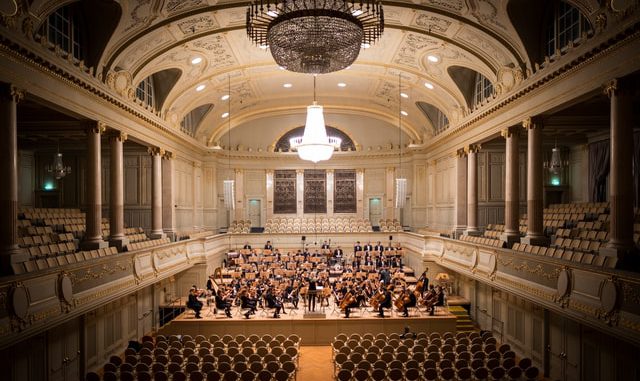

It is only now, as I am coming to the end of my degree, that I realise the impressive quantity of professional opportunities I have had due to my time at King’s. What I have found important to remember, is that even if experiences aren’t paid, the skills they can nevertheless offer, are often more valuable for your professional future than immediate money would be. The contacts I have made through music societies, lecturers and the King’s community have helped me realise how real the possibility of being involved in the London scene, at a high level, really is.
I have made a huge amount of contacts who are active in the London gig scene due to my involvement in music societies. The societies often bring in players from Conservatoires which allowed me to get involved in external gigs (many paid). From there, it was easy to get to know the ropes and I would keep meeting the same people every time – even in London, the music world can be small!
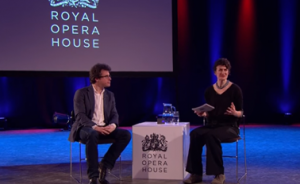
Regarding our staff, their reputations in the professional musical world and willingness to help students, are vital to preparing us for the professional world. Dr Flora Willson, one of our musicologists concentrating on nineteenth century opera, works regularly with the Royal Opera House and BBC radio.
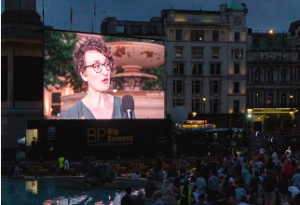
She also reviews concerts in The Guardian, which can be found here. She recently kindly offered us a seminar explaining the world of music journalism and is always happy to help anyone with questions. I have attached a picture of her interviewing renowned directors, conductor and singers (pictured) at the Royal Opera House.

Among our composition lecturers, we have Dr Ed Nesbit (pictured), who has had world premieres with the renowned London Sinfonietta (pictured), and many other ensembles.
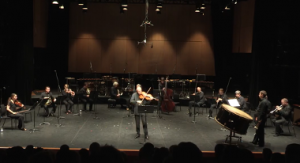
In running the Modern Music Society, I organised composer workshops and concerts, where Ed either regularly offered to mentor young composers or allowed us to perform his works. I still remember the time he invited me to his office and offered me all the parts to one of his works for me to perform: a sight rarely seen when performing contemporary works which usually incur copyright fees well into the hundreds of pounds! He attended rehearsals and was always keen to help at any time, giving me a taster of what it means to work with

composers professionally. Professor Silvina Milstein is another of our esteemed composers. Her works have been premiered all around the world, and she works regularly with the world’s leading contemporary music ensembles (here is an interview with the Birmingham Contemporary Music Group), and has released many CD’s of her works (pictured). She has been a valuable mentor to me, offering to put me in contact with influential conductors and musicians. It also goes without mentioning that one of our Emeritus professors, George Benjamin, is one of the most important composers of his generation, having had his works premiered by the Royal Opera House, among many other leading institutions.
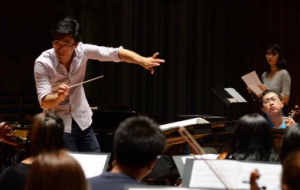
Having been the assistant conductor of the King’s College London Symphony Orchestra, I have had close contact with the orchestra’s conductor, Jonathan Lo (pictured). Jonathan is currently the director of Northern Ballet and conducts at the Royal Ballet (as well as many other orchestras). Jonny has mentored and helped me to pursue my passion by writing references or giving me contacts. Ultimately, he has made me realise how close and accessible the London scene really is.
My professional experiences and opportunities have not only been limited to the King’s music department. I have also had the opportunity to organise concerts and events with the King’s Business School and King’s Brazil Institute, allowing me to develop valuable arts administration skills, in a range of contexts. The contacts were partly due to talking to other students or responding to opportunities laid out in the music department’s regularly emails regarding professional opportunities.
Furthermore, the colloquia series where many important musicologists are invited to lecture, has given me a well-rounded perspective on what the current musicological world looks like, and what I will be entering into. The successful positions and experiences that alumni of the music department have had is also a source of inspiration in realising how achievable the experiences that I aim for, are. Ultimately, the contacts I have made within societies and gigs I have consequently been offered and the links our lecturers and King’s community have with the industry, gives us students a real drive to take advantage of these privileges. We are treated as up and coming professionals, making the professional scene considerably less daunting and even more appealing.
Read More:
If you enjoyed Rita’s post, check out her other ones on keeping up with your instrument while in a music BA, as well as a Day in the Life of a Music BA Student.
For more information about the music degrees available at King’s, check out the King’s College London Music department pages.

Leave a Reply